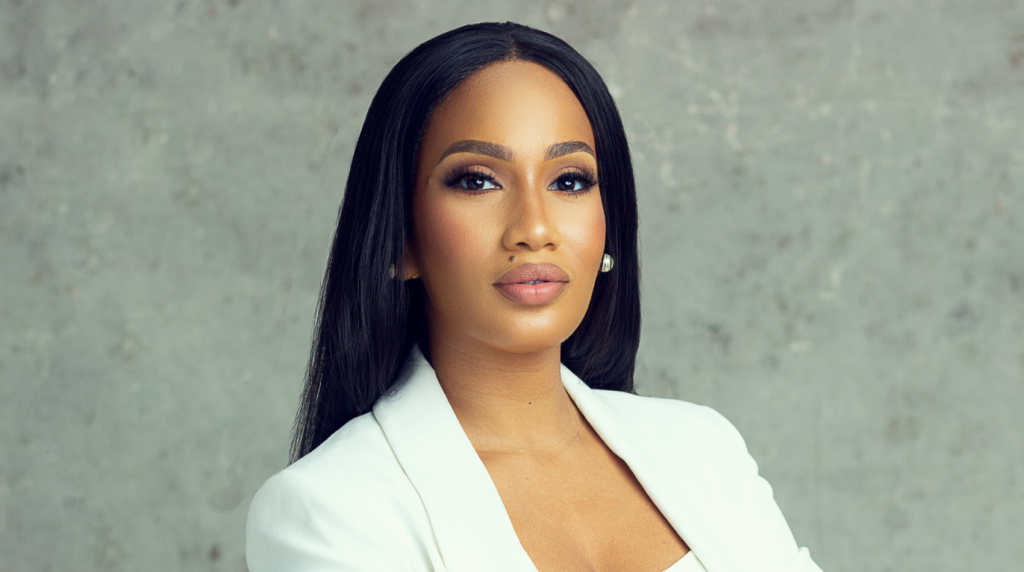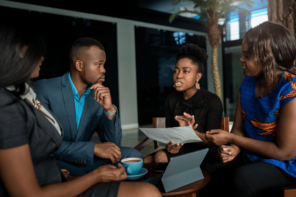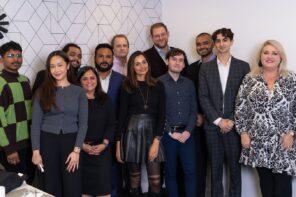
Thursday August 26, 2021
A lesson in female business success: Temi Marcella Awogboro
4 minutes read
A leading investment professional and executive, she currently serves as the Executive Director of Evercare Hospital Lekki, Nigeria, which is owned by the $1 billion Evercare Health Fund she helped create. She is also a co-founder and partner of investment funds Kairos Angels and the Magic Fund. Her other accomplishments include the Future Awards Africa Prize for Professional Service, and M&A Advisor’s European Emerging Leaders Award, and she sits on the Africa Advisory Board of Save the Children International.
A strong advocate of gender equality, she tells us about the secret of her success as a woman and what more needs to be done to level the playing field for female contributions across business and other sectors..
Why are you passionate about gender empowerment?
Women do two-thirds of the world’s work yet receive ten per cent of its income and own just one per cent of the means of production. This is frankly unacceptable!
It saddens me that women and girls around the world still do not fully experience equal rights and their potential as economic, social and sustainable development change agents remains vastly untapped. We cannot eradicate poverty and achieve social justice while gender inequality persists. Discrimination against women has negative implications for global security and development, economic performance, food security, health, the environment and governance.
I firmly believe the unique experiences and perspectives of women at all decision-making levels are critical in the formulation of decisions, policies and laws that work for all.
By calling out bias, questioning stereotypes, and mobilizing capital to forge an inclusive world, I am seeking to actively redress the gender equality imbalance.
Why is it important to have more female business and investment leaders?
The evidence shows that companies led by diverse management teams have a range of perspectives which allow them to better compete in a global economy. But many companies still consider placing women in senior positions as a riskier option, with higher expectations. In 2019, only 6% of Fortune 500 CEOs were women. Despite the fact that diverse-owned funds are overrepresented in the top quartile of private equity funds, less than 1.3% of the $69 trillion of global financial assets under management is managed by people of colour and women.
A 2015 report from the McKinsey Global Institute, found that advancing women’s equality can add $12 trillion to global growth. A Harvard Business School report on the male-dominated venture capital industry found that “the more similar the investment partners, the lower their investments’ performance”. In fact, firms that increased their proportion of female partner hires by 10% saw, on average, a 1.5% increase in overall fund returns each year. Furthermore, research by Deloitte suggests companies with an inclusive culture are six times more likely to be innovative.
What about in other sectors ?
As an investor in healthcare, I have witnessed first-hand how women have stood at the front lines of the COVID-19 crisis, as nurses, doctors, caregivers, innovators and as some of the most exemplary and effective leaders in combating the pandemic. It is no coincidence that the countries most successful in stemming its tide and impact have been led by women.
But the COVID-19 crisis has sadly highlighted the disproportionate burdens women carry and their inadequate representation at the highest levels of decision making. And new barriers have emerged to impede many people’s progress, such as unpaid care duties, unemployment and poverty.
More women are now being elected to legislatures across the world: women hold 21.2% of ministerial positions. But they are heads of state or government in only 22 counties. At the current rate, gender equality in the highest positions of power will not be reached for 130 years.
The emergence of female leaders can become a centrifugal force for good in the world. For the first time, we’re seeing examples of female leaders emerging from across the generations to use their knowledge for the good of society. Importantly, there are now ambitious and capable women running influential organizations who can activate physical change through the interplay of technology and policy.
What barriers have you come up against as a woman in your career?
I have often found myself the only female in the room with few natural allies. I have had to contend with many forms of discrimination. I have had to fight to have my voice heard and to be allowed into the room, let alone at the table.
I was told that I “would be a distraction”. That perhaps I should consider “pursuing a career in fashion” rather than such a “hard job”. I was faced with persistent attempts to discourage me from making investments and to pigeonhole me into more “appropriate” sales and marketing roles. I have had few mentors and role models.
The most insidious and destructive barriers have included the persistent microaggressions that stem from fundamental societal attitudes about what it is to be male versus female. And the toxic internalised bias of a woman’s “unentitled mindset” that often leads to a loss of confidence, especially in negotiating pay increases, and asking for promotions.
How have you overcome them?
What has kept me going over the years is a deep sense of purpose, an unrelenting tenacity, and an unwavering belief in myself.
I persevered with unrelenting focus on delivering results and challenging others’ preconceptions in pursuit of my vision and long-term goals. I have learned to leverage resistance as a key motivator to drive performance and, in so doing, I have been able to motivate and inspire other women.
I continue to pursue my goals by living a life that is purpose driven, passion filled and performance oriented. When one of those dimensions is out of alignment, it serves as a reminder to revisit priorities.
How has having a mixture of Nigerian, German and Scottish heritage informed your attitude towards equality?
I was born in Nigeria and raised in the UK and have lived and worked across four continents. I have never felt a stranger where I live, but never quite belonged. This forced me to forge a strong personal identity that was not wedded to any culture, dogmas, traditions and ideological concepts.
From a tender age, my parents and close family nicknamed me “Small But Mighty” because within my pint-sized package, came mighty aspirations. I’ve always refused to be restricted by the limits imposed by people’s expectations. This identity ignited my fight for equality on the global stage.
What progress towards female equality have you seen over your professional life?
There have been some remarkable milestones. Kamala Harris becoming the Vice President of the United States of America was hugely important. In her victory speech, she urged young girls to “Dream with ambition, lead with conviction, and see yourself in a way that others might not see you, simply because they’ve never seen it before.”
Women and girls remain organised, active and resilient in pushing for change. In fact, strong, autonomous feminist movements are one of the world’s most powerful drivers of lasting progress towards multiple forms of equality and justice.
One such example is the Equality Fund, of which I am an inaugural board and investment committee member. In a CA$ 300 million partnership with the Canadian government and the Ford Foundation, we have brought together gender-lens investing, bold government funding, and powerful, multi-sector philanthropy to unlock new capital for women’s rights organizations. In partnership with the World Bank, we launched the first sustainable development bond for gender equality and are activating over CA$ 1 billion, making it the largest self-sustaining gender equality fund in the world.
What barriers to female equality remain?
In the workplace, there is still a bias in many institutional policies and practices because they were originally designed for, and by, males. Women globally are still largely disenfranchised. Women’s poverty is directly related to the absence of economic opportunities and resources, including credit, land ownership, and inheritance as well as minimal participation in the decision-making process. Enabling women to achieve economic empowerment through initiatives such as reducing the disparity between what they and their male counterparts earn remains an important step towards progress.
What are some of your proudest achievements in your career?
After graduating with an MA (Hons) in Economics from the University of Cambridge, I started my career at Goldman Sachs International as a rare breed of female traders on the trading floor. I subsequently went on to pursue an MBA at Stanford Graduate School of Business before launching my career in private equity.
I have been uniquely privileged to operate at the intersection of healthcare, finance, technology and impact. My belief in access to quality care as a fundamental human right propelled me into building Evercare, with the vision to transform the healthcare landscape in emerging markets. As part of the founding Evercare team, I have scaled the platform from inception in 2015 to funding more than 30 hospitals, 20-plus clinics, 80-plus diagnostics centres and more than 11,000 caregivers, providing care for more than three million patients each year across six countries in Africa and South Asia.
Investing in, building, commissioning and operating Evercare Hospital Lekki, now one of the largest private hospitals in Nigeria, against the backdrop of a COVID-19 pandemic and a number of other unforeseen challenges, has been extremely rewarding.
Curzon PR is a London-based PR firm working with clients globally. If you have any questions, please feel free to contact our Business Development Team bd@curzonpr.com







Follow us